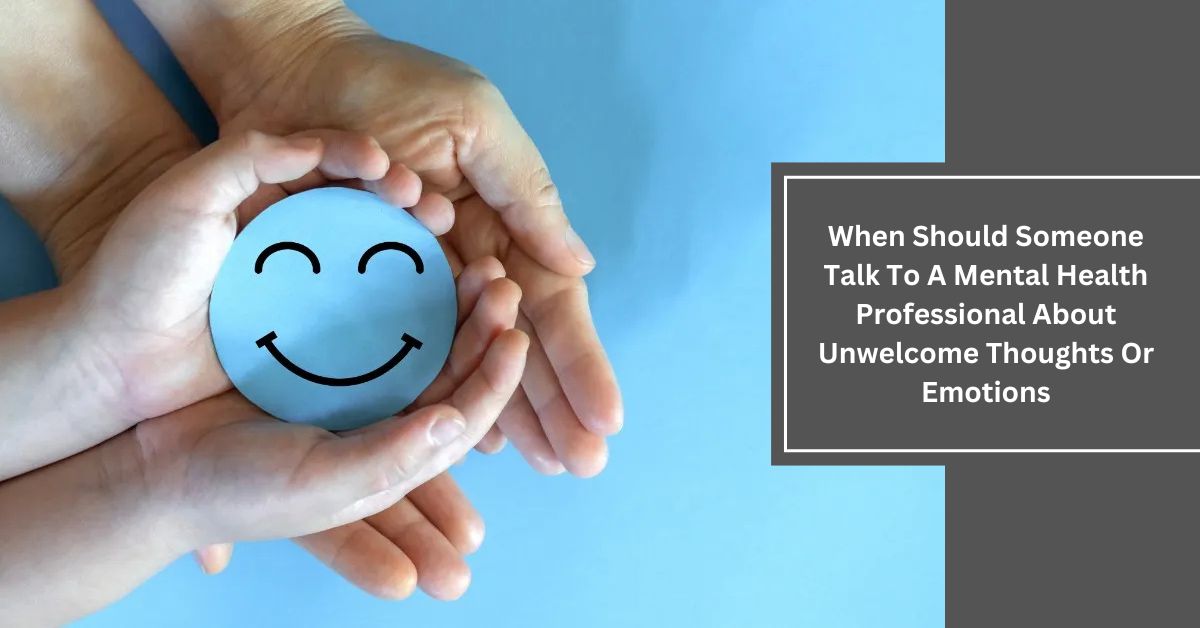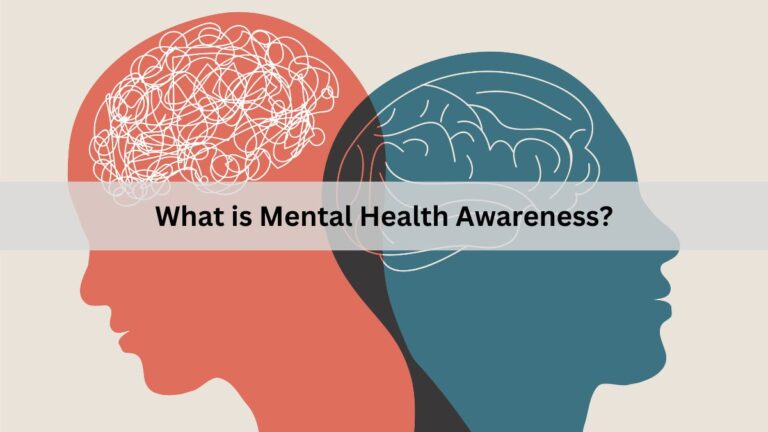When Should Someone Talk To A Mental Health Professional About Unwelcome Thoughts Or Emotions?
If you’re struggling with unwelcome thoughts or emotions that feel overwhelming or persistent, it might be time to reach out I realized this when I couldn’t shake negative feelings, and talking to a therapist changed everything.
If unwanted thoughts or emotions are persistent, overwhelming, or affecting daily life, it’s a sign to speak with a mental health professional. Early intervention can help address underlying issues and improve emotional well-being.
Stay tuned with us as we dive deeper into We’ll explore the signs to look out for and how getting the right support can make all the difference.
What Are the Common Signs That It’s Time to Talk to a When Should Someone Talk To A Mental Health Professional About Unwelcome Thoughts Or Emotions?
Common signs that it’s time l include feeling overwhelmed by unwanted thoughts or emotions that don’t go away. If these feelings start affecting your everyday life, like making it hard to concentrate, sleep, or enjoy things you used to, it might be a good idea to seek help.

Another sign is if you find it difficult When Should Someone Talk To A Mental Health Professional About Unwelcome Thoughts Or Emotions? or you feel stuck and unable to cope with stress in a healthy way.
Read More: Phillies Vs Red Sox Match Player Stats – In-Depth Analysis And Insights!
When Do Negative Thoughts Become a Serious Concern?
Negative thoughts become a serious concern when they are persistent, overwhelming, and start interfering with your daily life. If you notice that these thoughts are affecting your mood, making it hard to focus, or preventing you from enjoying things you once liked, it may be When Should Someone Talk To A Mental Health Professional About Unwelcome Thoughts Or Emotions?
them seriously. When these thoughts last for weeks or even months without improving, it’s a sign that you might need extra support.Another red flag is if these thoughts lead to feelings of hopelessness, guilt, or worthlessness, or if they cause you to avoid social situations or responsibilities.
If negative thoughts are making it hard to sleep, eat, or interact with others, When Should Someone Talk To A Mental Health Professional About Unwelcome Thoughts Or Emotions? can help you understand what’s going on and guide you toward healthier thinking patterns.
How Do Unwelcome Thoughts or Emotions Affect Daily Life?
Here are 5 ways unwelcome thoughts or emotions can affect daily life:
- Disrupted focus: It becomes hard to concentrate at work, school, or on everyday tasks.
- Sleep problems: Persistent negative thoughts can cause insomnia or restless sleep.
- Social withdrawal: You might start avoiding friends, family, or social activities.
- Increased stress: Constant unwanted emotions can heighten anxiety and lead to feeling overwhelmed.
- Physical symptoms: When Should Someone Talk To A Mental Health Professional About Unwelcome Thoughts Or Emotions? l distress may manifest as headaches, fatigue, or other physical issues.
Can Unwanted Thoughts Go Away Without When Should Someone Talk To A Mental Health Professional About Unwelcome Thoughts Or Emotions?
Unwanted thoughts can sometimes go away on their own, especially if they are temporary or caused by a stressful situation that eventually passes. Many people experience negative or unwelcome thoughts from time to time, and with self-care, relaxation, and time, these thoughts may fade.
However, if unwanted thoughts are persistent and affecting your life, they may not go away withou When Should Someone Talk To A Mental Health Professional About Unwelcome Thoughts Or Emotions? If these thoughts are causing ongoing distress, interfering with your ability to work or enjoy life, or lasting for weeks or months.
What Type of Mental Health Professional Should I See for Unwanted Thoughts?

Here are five types When Should Someone Talk To A Mental Health Professional About Unwelcome Thoughts Or Emotions? you might consider seeing for unwanted thoughts:
- Psychologist: They provide therapy and can help you understand and manage your thoughts through techniques like cognitive-behavioral therapy (CBT).
- Psychiatrist: This medical doctor specializes in mental health and can diagnose conditions, prescribe medication, and provide therapy.
- Licensed Counselor or Therapist: They offer support and guidance, often focusing on specific issues like anxiety or depression, and can provide various therapeutic approaches.
- Clinical Social Worker: They are trained to help with When Should Someone Talk To A Mental Health Professional About Unwelcome Thoughts Or Emotions? issues, providing counseling and connecting you with community resources.
- Psychiatric Nurse Practitioner: These professionals can assess, diagnose, and treat mental health issues, often combining therapy with medication management.
How Soon Should I Seek Help If I Experience Unwelcome Emotions Regularly?
If you experience unwelcome emotions regularly, it’s a good idea to seek help sooner rather than later. If these feelings are affecting your daily life, making it hard to work, socialize, or enjoy activities you once liked, it’s important to talk to a mental health professional. The sooner you address these feelings, the easier it can be to find effective ways to manage them.
It’s also time to seek help if your emotions start to feel overwhelming, last for weeks or months, or if you find yourself feeling hopeless or worthless. When these feelings impact your relationships or lead to physical symptoms like fatigue or headaches, it’s a clear sign that support can make a big difference.
FAQs:
1. What Are Unwelcome Thoughts?
Unwelcome thoughts are negative or unwanted ideas that pop into your mind unexpectedly. They can be distressing and often cause anxiety or discomfort, making it hard to focus on positive things.
2. How Can I Tell If My Thoughts Are Unwelcome?
If you find yourself dwelling on negative thoughts, feeling upset by them, or unable to shake them off, they are likely unwelcome. These thoughts can disrupt your daily life and make it challenging to enjoy activities.
3. What Should I Do When I Have Unwelcome Thoughts?
When you have unwelcome thoughts, try to acknowledge them without judgment. Practicing mindfulness, talking to a friend, or engaging in activities you enjoy can help lessen their impact.
4. Can Talking to Someone Help with Unwelcome Thoughts?
Yes, talking to a friend, family member, or mental health professional can provide support and perspective. Sharing your feelings can help you feel less isolated and more understood.
5. Is It Normal to Have Unwelcome Thoughts?
Yes, it is completely normal to have unwelcome thoughts from time to time. Most people experience negative thoughts, but if they become frequent or overwhelming, seeking help can be beneficial.
Conclusion:
unwelcome thoughts and emotions are common experiences that many people face at some point in their lives. While it’s normal to have negative thoughts occasionally, persistent or overwhelming feelings can significantly impact your well-being.
Recognizing the signs that it’s time to seek help is crucial for managing these thoughts effectively.
Read More:
- Spelling Bee Buddy – A Comprehensive Guide To Mastering The Nyt Spelling Bee!
- Arizona Diamondbacks Vs Seattle Mariners Match Player Stats – A Comprehensive Breakdown!
- Oceanofpdf – A Comprehensive Guide To Free Ebooks And Legal Considerations!
- Martie Allen – A Comprehensive Insight Into Her Life, Relationship, And Fame!







